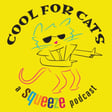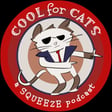Become a Creator today!Start creating today - Share your story with the world!
Start for free
00:00:00
00:00:01

Book Review: Miles A. Copeland III: Two Steps Forward, One Step Back
The name Miles Copeland elicits many reactions in the music industry. Even more so when he is associated with Squeeze. In this episode, I speak to the many sides of Miles in his managerial relationship with the band, his personal doings with Jools Holland and overall how from the perspective of someone who has been on the rebellious side of music for almost 50 years, why the reader can appreciate his unique sense of humor, his business acumen and let's face it, his legendary reputation!
--- This episode is sponsored by · Anchor: The easiest way to make a podcast. https://anchor.fm/appTranscript
Introduction to 'Cool for Cats' and Miles Copeland's Autobiography
00:00:08
Speaker
Hello and welcome to Cool for Cats with me, Amy Hughes. We're here to invite you in for black coffee and a chat about our favorite band Squeeze. In this mini episode, I'll be offering my thoughts and opinions on Miles Copeland's The Third.
Why Review Miles Copeland's Book?
00:00:28
Speaker
Two steps forward, one step back, his autobiography from 2021.
00:00:34
Speaker
Normally, I wouldn't be doing a book review on a podcast, but I felt that this particular book had a lot to offer in the realm of squeeze information. So I'm going to keep it more focused on what squeeze has to do with Miles Copeland.
Miles Copeland: Music Mogul with a Spy Family
00:00:58
Speaker
There's a lot going on in this book because Miles has involved himself in so many aspects of show business, of the music business, getting his start way back in the 70s, way back.
00:01:14
Speaker
So for purposes of this mini podcast, I'll be speaking more to Miles's interactions with Squeeze and the outcomes and the ins and outs and outcomes and incomes of all of that.
00:01:31
Speaker
So what I'll first say is for those of the listeners who are not familiar with Miles, he's a very interesting, colorful individual. I have never met Miles personally.
00:01:47
Speaker
But about 30 plus years ago, I did have the opportunity to go to the, what would be considered the, quote unquote, offices of IRS records, which in central London, a lot of these offices, buildings, things like that, are called houses.
Toughness from Upbringing: The Copeland Family Influence
00:02:07
Speaker
So I was in Bugle House, and he references that later on in his memoir.
00:02:14
Speaker
So for the beginning portion of this, I'll give a very, very quick backstory because I believe a lot of people who are familiar with Squeeze and the sort of new wave punk rock or punk rock new wave, which came first,
00:02:31
Speaker
are familiar enough with Miles's personality, the way he has come through a lot of times in other people's storytelling, quotes, what he's accomplished. And most people who are either
00:02:51
Speaker
in Miles's atmosphere, his environment, the business, have classified him as a very unforgiving, tough as nails kind of person. And maybe some of that has a little bit to do with his upbringing. His father worked for the CIA, and his mom was in British intelligence,
00:03:18
Speaker
And so, you know, you have an interesting background right there.
Miles's Global Perspective: Middle East to England
00:03:24
Speaker
He also was one of four children. He had a sister, Lenora, they called Lenny. And then most of you would know that his other two brothers are Stewart, who ended up being the drummer in the police.
00:03:38
Speaker
and Ian, Ian Coplan, who actually helped out very much in the beginning and then went on to become his own businessman with his own booking agency in the US. But the family mostly kept in the early years their existence around the Middle East and England.
00:04:03
Speaker
So, Miles had a very unusual, I would say, very enlightening upbringing. And for that to work itself into his interests in music in the 70s, once he got past college, he actually came to the United States and went to college in Alabama.
00:04:29
Speaker
So, he's had a very well-rounded sort of global perspective and obviously with his parents and especially his father involved in government work, he was very, not so much in the know in his younger years because the Middle East was very, very different in the 60s and early 70s.
00:04:54
Speaker
So, Miles was exposed to quite a lot of ethnicity backgrounds, to people, and I think that's probably what has helped him to be so straightforward and not kowtow to a lot of the business acumen that kind of sprung up.
Managing Squeeze: Recognizing Talent and Challenges
00:05:14
Speaker
He was able to be one of those, in quotes, founding fathers.
00:05:18
Speaker
So with regards to Squeeze, Miles had started off by getting into the business, wanting it to do it from the ground up, and had seen a lot of bands. And he had come upon Squeeze kind of in left field. He took to them very well because he really, obviously, truly noticed that Chris and Glenn were the heart and soul. But he also noticed
00:05:47
Speaker
that Jules Holland also had a real character, a real personality. And for those of us who know Squeeze, we obviously know that that's pretty much true. And really wanted to take Squeeze under his wing
00:06:05
Speaker
and sort of I wouldn't say kind of become their model manager sort of like Brian Epstein did with the Beatles but he truly enjoyed the music that they were making and there were a lot of
00:06:20
Speaker
bands out there who had come into Miles Circle in those sort of early 70s, mid 70s, and they weren't quite as impressed with Squeeze's sort of
00:06:36
Speaker
all around good musicianship. Because if you remember, and Miles makes a point of this in his book, that a lot of it was anti-music. So the bands that he was into when he first started, he was into the sort of prog rock and had become friends
00:06:56
Speaker
with those people in Head Started, Wishbone Ash, and Stewart, his brother, had become a drummer, very good one, and had been in a band called Curve Dare. So Miles was able to work himself into that sort of entrepreneurship, managerial, come, I'm gonna support you role. And whether or not other bands had dynamic personalities, or he clashed with personalities,
00:07:26
Speaker
and some of the people they had to deal with, he really saw the essence of Difford and Telebrook being able to come together, give this band a solid foundation with their music. So that's where Miles was able to step in and essentially start their pathway to being able to be accepted by
00:07:55
Speaker
Not the people that Miles may or may not have been working with, and by that I mean the industry bigwigs, or somebody super important in London. He was based in London, so he knew of a lot of the pub scene, the environment surrounding that. And so he, again, a lot of this was a DIY situation, especially with Squeeze.
00:08:22
Speaker
So he was the one who came up with the the label for Deaford Fun City and Deaford in his mind and he knew was not a fun city. So he always had that little play on word thing going. So he does have a sense of humor.
00:08:39
Speaker
And the way he describes being involved with them is a lot of dedication to their sort of what they were going to dress like. Were they going to have what we would now consider nowadays in the 21st century a brand image? What could he do? And unfortunately,
00:09:01
Speaker
He couldn't do much. He looks back on it as sort of the kind of guy that would roll his eyes and say, OK, guys, and he describes this in the book by giving them a couple of hundred pounds. And then Chris and Glenn would go off and buy outlandish clothes that had nothing to do with anything that was going to make a stage presence for the band.
00:09:22
Speaker
So he does speak highly of wanting to find at the start a really, really good drummer. And he has a lot of high praise for Gilson, which he felt was
00:09:38
Speaker
a presence, a seasoned musician that the band really needed. And the way the thought and opinion I have is that, you know, he's got a couple of young kids, let's bring Gilson in, he passed the audition, and they were on their way. So he was essentially with Squeeze, this was sort of the building block
00:10:04
Speaker
of what would become Miles' future.
Squeeze's US Market Struggles and Successes
00:10:09
Speaker
And he does recall and describe in great detail a lot of the first gigs wanting to bring them to America, getting that major label signing, which he was able to do with A&M Records, against all odds. And I mean, that's kind of a cliche, but
00:10:33
Speaker
again, a lot of the selling of this band was the songwriting and the songs, which they were having a lot of problems with in the realm of understanding British music at that time. So they did that whole, you know, hard scrabble, we're going to play every gig we can get, although Miles did and his
00:10:59
Speaker
insight into American club scene. He was able to bring Ian into that realm of helping to book clubs and gigs, etc. And the fun part, of course, again, was that by the time Miles had started up IRS records, Ian was over in America in Macon, Georgia.
00:11:25
Speaker
with the FBI, which means actually Frontier Booking International. So the two of them are essentially able to corral the band into getting these gigs, getting the A&M record. Miles was able to get the A&M record deal, and so it looked really good from that perspective.
00:11:46
Speaker
and he does give a lot of praise to squeeze as a unit for helping to sow the seeds for basically of that time any other band that was going to come to the States and really make a difference. You know he does it you know he does have some regrets when he looks back at that time in the sort of
00:12:12
Speaker
77 to 78 period and realizes that the guys were just doing the best they can. There's the oft told legendary story, especially we've heard it a lot from Chris Difford that they played at a club and there was a man and a dog and the man left. But anyway, Miles tells it with a lot of straightforward humor.
00:12:36
Speaker
And the overall art that I get from the way Miles tells his story is he does step back and look at the situations and realize he is really a rebel when it comes to his interest in music, the bands that he wanted to sign later on. He put a lot of faith, and he did. He put a lot of faith into Squeeze.
00:13:03
Speaker
And one of the sticking points that a lot of people talk about as we're getting up to around Argy-Bargy time around 1980 was he realized that because the stage presence wasn't really there, he encouraged
00:13:20
Speaker
Jules to come out and sort of be the master of ceremonies, making the introduction, knowing that Jules had that sort of, you know, kind of crazy sense of humor. And he saw that in Jules and he really tried to make it a point to not put Jules above squeeze, but essentially to target that hidden gem in the band.
00:13:45
Speaker
And if you read into it, a lot of it kind of sort of backfired a bit because as they're getting into that point, Jules, although he's an excellent musician and has a way with his personality and the way he presents himself,
00:14:04
Speaker
there started to be a little bit of that sort of tension where you would imagine that the two most prominent people in the band, Glenn and Chris, would have most of the press. They would be the ones who would be speaking for the band because they were the songwriters. And Jules was sort of becoming an outsider and was not really into
00:14:27
Speaker
the sort of musical direction, because you know his love, if you're a Squeeze fan, you know his love is that whole New Orleans jazz, the boogie woogie piano style that he perfected. And as the tensions were kind of sort of mounting, he, Miles,
00:14:46
Speaker
was getting a little bit of a sign from Jules was that you know these guys they have integrity and you don't have to really make them superstars and throw a bunch of money at them but Miles wanted these guys to succeed and at one gig that's what he did and he gave them the money
00:15:08
Speaker
And Jules had warned him beforehand, saying, you know, don't sort of insult Chris and Glenn's intelligence when it comes to their musicianship, but also the amount of, let's put it bluntly, cash that they're worth.
00:15:27
Speaker
So at one point, that's what happened. And Jules said, well, if the situation is going to be like this, if we're going to have issues like that, then I suggest you become my manager and we'll just walk away from Squeeze as a unit. And in October of 1980, that's what happened.
00:15:53
Speaker
So after R.G. Bargi, the dynamics changed. And in essence, that's when Miles stepped away from Squeeze. And he had known that Jake Rivera, who was Elvis Costello's manager, had really shown an eye for Squeeze.
00:16:16
Speaker
And also, by this time, Miles was heavily involved with his brother's band, you know, that little three-piece band called The Police. And Miles does admit now that he believes that there was some
00:16:34
Speaker
You know, jealousy is like the wrong word to use in this context, but he felt that and he notes that they squeeze and especially Chris and Glenn believed that they were losing Miles attention, his promotion, his managerial duties, and they were being focused on the
Transition to The Police and MTV Influence
00:16:55
Speaker
police. And of course, for all of us who know of a certain age and generation,
00:17:00
Speaker
That's kind of what started to happen. So, Costello's manager, Jake, a very flamboyant individual, kind of wanted to go right in there, just, you know, bust his way right in and take hold of Squeeze, because he knew now that Miles was not there. Jules was not there.
00:17:23
Speaker
If you haven't heard about Anchor by Spotify, it's the easiest way to make a podcast with everything you need all in one place. Here's how it works. Anchor is tools that allow you to record and edit your podcast right from your phone or computer. When hosting on Anchor, you can distribute your podcast on listening platforms like Spotify, Apple Podcast, and more. It's everything you need to make a podcast in one place. And best of all, Anchor is totally free.
00:17:52
Speaker
Download the Anchor app or go to anchor.fm to get started.
00:18:22
Speaker
didn't quite mesh and they were a little bit rudderless but let's face it out of all of that came Eastside Story and with Elvis's input into that situation he remained very good mates with the band and Glenn had worked with Elvis in 1980 providing vocals from a whisper to a scream.
00:18:48
Speaker
So the camaraderie was there, the managerial position that Miles had held just basically fell away. And in retrospect, you can understand because I think Miles wanted to broaden his horizons. He felt that he had put a lot of effort into Squeeze and he wasn't getting the love from, not the band, but from the record company.
00:19:16
Speaker
He had a lot of great people with him at IRS who were out there, you know, basically plugging away at radio stations. Again, you got to remember this was like, again, the late 70s, early 80s, who would be, you would have a radio promoter guy and a label promotion guy in all the major cities or regions of the United States going to the local radio stations and saying, you got to play this and you got to play this and you got to play this.
00:19:45
Speaker
Certainly, at the summertime, late 1981, MTV appeared and that obviously gave more visual identification to the new squeeze and it also helped the police.
00:20:02
Speaker
So around this sort of swirling-ness, Miles discusses in his book a lot of the other acts that he was able to sign the dynamics and the history in his interaction with a lot of these
00:20:24
Speaker
Personalities if you know for want of a better word he Really really loved the go-go's but again there was a lot of stuff that happens And then later in the bangles where there's just a lot of misunderstanding
00:20:40
Speaker
And Miles was a person who was going to go in there and fight for whatever band it was, even if it was bands that were just too much to handle, even from a managerial point of view. Miles went in there, especially with bands like The Cramps.
00:20:58
Speaker
who really you know you look at at the stage presence go back and look at a couple of you know youtube videos or listen to their music the same like say with like um the dead kennedy's all those bands just could not find a foothold so miles branched out
00:21:14
Speaker
And he was able to use MTV to his advantage. He was actually able to do his whole cutting edge series, which I'm not quite sure maybe a few listeners could let me know. So send me an email.
00:21:31
Speaker
that it might be available now on Blu-ray or DVD or some other version other than VHS because that's the only way I was able to find out.
Miles's Expansion and Management Style
00:21:41
Speaker
And by that time, around 1985, Jules had come back into the realm of Squeeze, of course, for Cose Fantudi Fruity.
00:21:50
Speaker
So a lot of that area with those bands coming up, REM as well, Ian was able to contribute a lot because of his geographical location in the United States. So Miles and Ian were really a force to be reckoned with.
00:22:08
Speaker
And then Miles goes and sort of talks about all the other sort of goodwill and some, you know, really weird stuff that happens being called in to talk about government intervention and helping to understand the way that the economy in Britain worked or something that because of his obvious lineage to his father, how do we work with people, you know, in the Middle East?
00:22:37
Speaker
which Miles, now in his sort of mature years, finds it quite amusing. But he never seems to come off to me in these pages as someone who obviously was not a very weak individual, who stood up for the people that he believed in, wanted to do them right, even possibly when the odds were against you.
00:23:06
Speaker
And that is how, in a lot of ways and avenues, he took to squeeze. Now, he does take tasks, you know, for certain ways, especially when he talks about remembering events that took place.
00:23:25
Speaker
I don't know how Miles remembers all this stuff in the way that he does. It is quite amusing. But, you know, he, in a minor way, took to task some remembrance of Christopher that got kind of mixed up. And he, in a way, chastises Chris for saying that because Miles says, you know, basically, it didn't happen that way. It happened this way. And I know that for sure. And you don't want to disagree with Miles Copeland, right?
00:23:51
Speaker
So, all in all, I would say that if you have only known about miles in that time period, if you have read about things in his later years after the police broke up, he was basically Sting's manager for many, many years.
00:24:14
Speaker
And his way of being able to come across as someone you don't mess with, I think in a lot of ways that could be quite old school and turn a lot of people off. And some of it could be manufactured as Miles kind of sort of admits, you know, he's kind of playing the game.
00:24:32
Speaker
which he ended up being very good at. But he also has high vision for a lot of music, and that turned into a lot of global kind of music from the Middle East, and world music, as we would call it, something that Peter Gabriel has espoused upon as much.
Final Thoughts on Miles's Book and Audience Engagement
00:24:56
Speaker
So, in conclusion, I would say that this book is relevatory as far as if Miles admits that he comes off as, you know, a butthead and hard to get along with.
00:25:12
Speaker
then that's your opinion. I, however, kind of went into this with no other reviews. I didn't want to really see what anybody else had ever said. There's a couple of reviews on the book jacket, but they're from industry insiders and people that he worked with.
00:25:28
Speaker
And a lot of them are very effusive about the way that he was able to handle himself. So if there's any way that you would be able to grab this book off of Amazon or go to your local library,
00:25:44
Speaker
I would highly recommend it because again, it does offer a lot of unique insights into his way of living, the way that he dealt with bands. You know, there's not a lot of detail because Miles at his age now, I believe he's about like 75 or so, has to cover a lot of ground.
00:26:08
Speaker
So if you want something extraordinarily detailed about Squeeze, you really won't find it, but you will find insightful anecdotes and get a better understanding of Miles, how he grew up, what he did to get basically where he was with Squeeze and is today. So again, the book is called Two Steps Forward, One Step Back, My Life in the Music Business, Miles A. Copeland III.
00:26:37
Speaker
And again, if you have any opinions from you guys about what you think Miles is like, has anybody ever met Miles, my podcast listeners, or know of any interactions that you might want to sort of drop in, please do. You can find us on the Facebook and Twitter.
00:27:01
Speaker
Twitter pages we have out there and our feeds at Cool4CatsPod, definitely drop me a line. Feel free to basically speak out and give what you believe is to be an honest opinion about the man.
00:27:22
Speaker
Having said all that in this mini podcast, we'll be back again soon. We're going to have some new episodes coming up and I'm going to get some great interviews. I got a few people in my back pocket that I'm interested in talking to and we will see you again soon.







